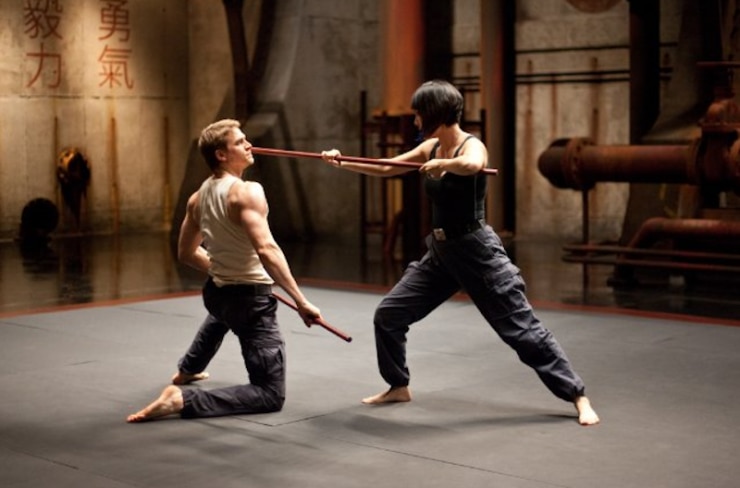Nikki Baughan, editor of MovieScope
magazine, said Pacific Rim was in bad company at the box office this
summer, with films such as Man Of Steel, The Great Gatsby and World War Z
all incapable of meeting the three Bechdel criteria.
‘Yes, they have female characters in them – indeed, striking characters like Daisy Buchanan, Mako Mori and Lois Lane – but they all fail the test for one reason or another,’ she told Metro.
‘Unfortunately, these women are not independent characters in their own right, but designed to interact with and support the males around them...’
‘If girls grow up without seeing strong female characters on screen – leaders, engineers, scientists – it has a very real impact on how they see their place in the world,’ she said. ‘It’s a vicious circle and the Bechdel test is an important tool for highlighting this problem. The Bechdel test acts as a magnifying glass; by breaking down a film in these simple terms, it draws attention to the shocking gender disparity that exists in the majority of cinematic narratives. The Bechdel test isn’t intended as a mark of quality, rather of gender diversity within a narrative.’
The problem lies on the other side of the camera. According to research carried out by the University of Southern California, just one in six of the directors, writers and producers behind the 100 top-grossing movies at the US box office last year were female.
‘Women are under-represented in English language films, but it’s not surprising when you look at the dominance of men behind the camera,’ said film writer Stuart Barr, a contributor for movie websites Screenjabber and Chris And Phil Present.
Baughan added: ‘Male screenwriters write from their own perspective and experiences and that usually – though not always – results in female characters that are either absent or entirely unsatisfactory. It’s a sad fact that, for various reasons historical and financial, the mainstream film industry remains the enclave of the straight, white, middle-class male.’
Read the rest of the Metro article at The Bechdel Test and why Hollywood is a Man's, Man's, Man's World
‘Yes, they have female characters in them – indeed, striking characters like Daisy Buchanan, Mako Mori and Lois Lane – but they all fail the test for one reason or another,’ she told Metro.
‘Unfortunately, these women are not independent characters in their own right, but designed to interact with and support the males around them...’
‘If girls grow up without seeing strong female characters on screen – leaders, engineers, scientists – it has a very real impact on how they see their place in the world,’ she said. ‘It’s a vicious circle and the Bechdel test is an important tool for highlighting this problem. The Bechdel test acts as a magnifying glass; by breaking down a film in these simple terms, it draws attention to the shocking gender disparity that exists in the majority of cinematic narratives. The Bechdel test isn’t intended as a mark of quality, rather of gender diversity within a narrative.’
The problem lies on the other side of the camera. According to research carried out by the University of Southern California, just one in six of the directors, writers and producers behind the 100 top-grossing movies at the US box office last year were female.
‘Women are under-represented in English language films, but it’s not surprising when you look at the dominance of men behind the camera,’ said film writer Stuart Barr, a contributor for movie websites Screenjabber and Chris And Phil Present.
Baughan added: ‘Male screenwriters write from their own perspective and experiences and that usually – though not always – results in female characters that are either absent or entirely unsatisfactory. It’s a sad fact that, for various reasons historical and financial, the mainstream film industry remains the enclave of the straight, white, middle-class male.’
Read the rest of the Metro article at The Bechdel Test and why Hollywood is a Man's, Man's, Man's World


It's obviously a problem that has been going on for decades. I first became aware of it as a teenager, many moons ago when my younger brother and I would go to movies that he thought were great and I was bored by. I realized at an early age that they were basically stories about boys having all the fun while the girls, if they were even there, just got to sit around and watch. Now a grandmother, my only granddaughter stands before me with arms crossed and a grimace on her face and shouts, "I'm sick of all this boy stuff," after a morning of cartoons. Having written many female-oriented scripts and never getting them beyond the "We like it, don't love it stage," I still haven't given up. I love the fact that young women like you, Caitlin, are taking up the cause of equality, with regards to the right to be entertained. You have a new fan. All the best, Luanne Brown
ReplyDelete